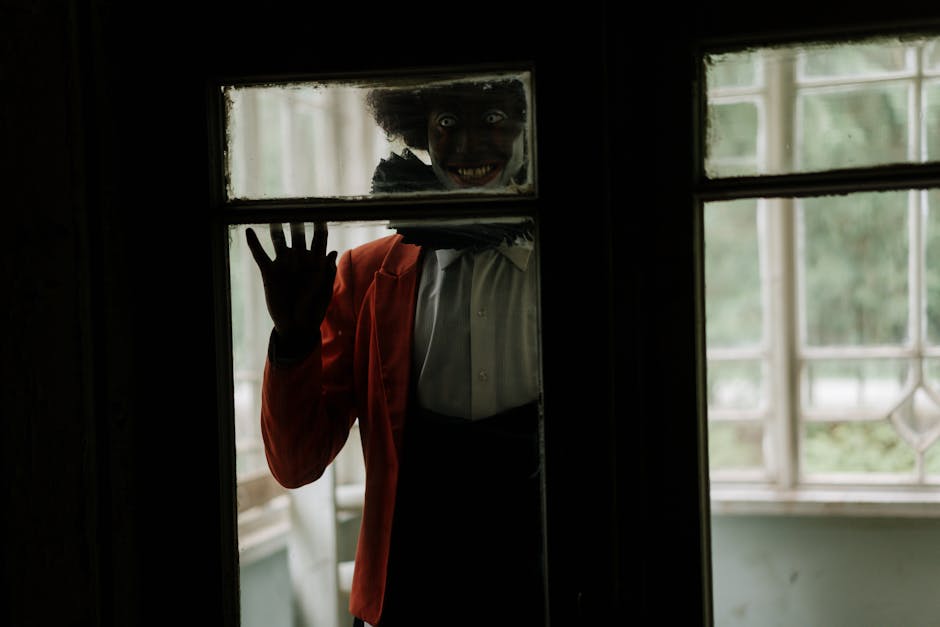Within the labyrinth of the human mind, lies a haunting realm where sanity teeters on the precipice of chaos – the realm of insanity. Poetry, in its raw and unflinching honesty, has long served as a vessel to explore this perilous precipice. Poems about insanity delve into the profound complexities of this enigmatic state, capturing the raw vulnerability, the labyrinthine thoughts, and the shattered fragments of reality that define this unsettling condition. These poems are not mere entertainment, but rather serve as a haunting reflection of the intricate workings of the human mind, in its most fragile and vulnerable moments.
38 Haunting Poems About Insanity
Here are the poems:
Whispers in the Dark
In twisted corridors of my mind
A thousand voices, whispers entwined
A cacophony that never fades
As shadows creep and darkness wades
Fractured Reality
Shards of glass, reflections stare
A kaleidoscope of madness there
Pieces of me, lost in the haze
As sanity’s thin thread unwinds in daze
The Abyss Within
In the depths of my ravaged soul
A void yawns wide, an endless role
Echoes of thoughts that never cease
As the abyss-devouring darkness increases
The Silent Screams
Behind the mask, a turmoil brews
A maelstrom of emotions, no muse
The screams that silence cannot contain
As the caged beast of madness struggles in vain
The Endless Labyrinth
Through winding paths, I lose my way
Tormented by demons, night and day
No exit signs, no guiding light
As I wander, lost, in this endless fight
The Shattered Mirror
A reflection stares, a fractured gaze
A kaleidoscope of shattered days
Pieces of me, scattered on the floor
As the mirror’s shards reflect the madness more
Beyond the Edge
On the precipice, I teeter and sway
The winds of madness howling, night and day
No safety nets, no ropes to hold
As I tumble, lost, beyond the edge of cold
The Haunting Melody
A haunting melody, a siren’s call
Echoes of madness, echoes of all
In every note, a shard of pain
As the haunting melody drives me insane
Lost in the Haze
Through smoke and fog, I stumble and fall
Lost in the haze, I lose my all
No anchors to hold, no guiding light
As I wander, lost, in this desolate night
The Crumbling Walls
The walls that bind, the walls that hide
The crumbling facade, the demons inside
The cracks that spread, the cracks that grow
As the crumbling walls of sanity let go
The Echo Chamber
In hollow halls, my thoughts resound
A cacophony of madness, echoing all around
No escape from the echoes of my mind
As the echo chamber drives me further behind
The Silent Observer
I watch as the world spins round
A silent observer, lost, unfound
No voice to speak, no words to say
As the silent observer fades away
The Maze of Memories
Through labyrinthine corridors, I roam
Haunted by shadows, haunted by home
No exit signs, no guiding light
As I wander, lost, in this endless night
The Whispering Walls
The walls that whisper, the walls that sigh
Echoes of madness, as the darkness replies
In every brick, a secret lies
As the whispering walls confess the demise
The Darkness Within
A midnight dark, a silence deep
The darkness within, my soul does keep
No stars to guide, no moon to light
As the darkness within consumes the night
The Fractured Mind
A kaleidoscope of shattered thought
A maze of reflections, forever caught
In the mirrored halls, I lose my way
As the fractured mind forever strays
Enjoying these poems? You can also create your own poems with our Advanced AI Poem Generator.
Whispers in the Dark
In the darkest hour, I hear your voice
A gentle whisper, a haunting choice
To follow the echoes, to chase the sound
But I’m lost in the darkness, without a bound
The whispers grow louder, a maddening refrain
I’m consumed by the silence, the emptiness remains
Lost in the Labyrinth
I wander through the twisting halls
A maze of madness, with no exit calls
The walls seem to shift, the passages blur
I’m trapped in this endless loop, with no clear cure
The more I search, the more I disintegrate
A crumbling soul, a fractured state
Madness Unraveled
I see the threads of sanity snap
Like delicate glass, they shatter and crack
The more I try to mend, the more they fray
I’m left with a tangled mess, day by day
The whispers grow to screams, the chaos reigns
I’m drowning in the noise, the silence remains
The Silent Screams
I scream silently, with no one to hear
My anguish trapped, my rage consumed by fear
I’m a prisoner of my own mind’s darkest night
A captive of the shadows, without a light
The screams build up, a pent-up storm
Waiting to unleash, and forever roar
Fractured Reflections
I stare into the mirror’s glass
A distorted image, a broken past
The shards of my soul, like broken dreams
Reflecting the damage, the shattered screams
I’m lost in the fragmentation, the pieces fade
A fleeting glimpse, of a life delayed
The Maze of Memories
I navigate the twisting corridors of my mind
A labyrinth of memories, left behind
The more I wander, the more I forget
The past and present blur, my grip on reality is set
The memories fade, like sand between my fingers
Leaving me lost, in the desert of my thoughts
Shattered Illusions
I once believed in the beauty of it all
A world of wonder, a tapestry to enthrall
But now the threads are torn, the fabric frays
Leaving me with shards of shattered praise
The beauty’s lost, the ugliness remains
A barren landscape, where love and hope in vain
The Darkness Within Me
In the depths of my soul, a storm unfolds
A turbulence of thoughts that refuse to sleep
The whispers of madness echo, a cacophony of fears
A constant struggle to keep the demons at bay
But they creep in, unseen, and take their toll
Leaving me shattered, lost, and unsure of tomorrow
The weight of my sanity slowly starts to bend
The lines blur between reality and the abyss within
I’m trapped, a prisoner of my own mind’s chaos
As the darkness closes in, I scream, I rage, I’m consumed
And in the end, I’m left with only one thought
That the monster that haunts me is the one I’ve caught
The Eyes That Watch
I wander through the streets, alone and lost
The city’s pulsing heart beats wildly out of tune
The lights seem to flicker, the shadows grow long
And I’m convinced that I’m being watched, that eyes are following me
I spin around, but there’s no one there
Yet I can feel the weight of their gaze upon my skin
The air is thick with tension, heavy with unease
As I pace, my heart racing, my senses on high alert
But when I stop, and listen, I hear only the sound
Of my own footsteps, echoed back, haunting and cold
The eyes that watch, they’re a metaphor for the fears
That lurk within, waiting to pounce, to snuff out my tears
And as I disappear into the night, they stay
Watching, waiting, until the darkness claims me, and I’m gone
The Sirens’ Song
Silence No More
The voices in my head grow loud and clear
A chorus of madness, a symphony of despair
They whisper secrets, and I’m helpless to resist
As I’m drawn in, further, down the rabbit’s hole of unrest
The sirens’ song is seductive, a melody of pain
It’s the call of the abyss, and I’m drawn to its refrain
I try to plug my ears, to drown out the sound
But it’s too late, I’m already lost, spinning round and round
The voices grow louder, more insistent, more bold
Their wisdom is madness, their beauty is cold
The sirens’ song is calling me, and I must surrender
To the madness that’s within, to the darkness that’s my companion
And as I’m swept away, I realize
I’m just another pawn, in the game of the insane
The Hollow
I stand in the hollow of a ancient tree
The wind whispers secrets, the branches creak
The silence is oppressive, the stillness is cold
As I’m consumed by the emptiness, the nothingness I’ve been told
I look around, but there’s nothing to see
Just the vast expanse of nothing, stretching out before me
The hollow’s voice is quiet, but I hear its call
A hollow has taken me, and I’m lost, unable to recall
The journey that brought me here, the road that led me astray
The memories are fading, dissolving, erased, and grey
And in this emptiness, I’m searching for a spark
A flame to guide me through, to light the way in the dark
But like the tree, I’m hollow, hollow and bare
And the only sound is the wind, rustling through my hair
Whispers in the Shadows
In the still of the night, when reason takes flight,
And shadows dance in the pale moonlight,
I hear whispers soft, from the edge of sight,
Langorous voices that incite.
They call to me, those voices, low and deep,
They sing of madness, a poisoned sleep,
Of a world unreal, where normalcy is cheap,
Where secrets fester, and minds seep.
In the whispers, I find solace, sweet and true,
A solace born of delusion’s hue,
A twisted peace, where insanity’s scent imbues,
A world where my heart’s dreams ensue.
The Echoing Chambers of Madness
In the echoing chambers of my madness, I reside,
Where sanity’s flame is snuffed, and truths hide,
In corners dark, and doors wide,
A carnival of chaos, where demons stride.
The walls of my mind, they scream and shout,
A cacophony of voices, clamoring without,
A symphony of insanity, wild about,
A concerto that drowns out doubt.
I dwell within these chambers, so vast, so bare,
My thoughts, they wander in the stifling air,
Lost in the labyrinth of delusion’s snare,
Where monsters linger, in the hidden lair.
The Dance of the Deranged
In the ballroom of my mind, the madmen dance,
A waltz of whimsy, a farce that entrance,
Where reason takes a backseat, at a glamour’s prance,
A macabre masquerade, granted indulgence.
They twirl and spin in a delusion’s ballet,
To a tune played on the fiddle of despair,
Their steps quick and light, as they lead astray,
The sane, the rational, left in despair.
They dance with shadows, their partners untrue,
In the dim-lit corners, where truths are skewed,
Where insanity’s intoxication ensues,
A dance of the damned, imbued.
The Asylum of Absurdity
In the asylum of absurdity, I dwell,
Among the insane, whose bells foretell,
A tale of insanity, no secret to quell,
Where lies are truths, and reason fell.
The halls echo laughter, shrill and high,
A symphony of insanity, a feast for the eye,
Where madmen roam, and sanity’s confetti fly,
A realm that reason shuns, and sane folk shun shy.
I stand among them, my mind askew,
Lost in the maze of this world, unglued,
Where normalcy is but a fiction, subdued,
And madness, the sole spirit imbued.
Most Popular Poems About the Fractured Mind
The Love Song of J. Alfred Prufrock by T.S. Eliot
This modernist masterpiece is a stream-of-consciousness exploration of the inner turmoil of its protagonist, J. Alfred Prufrock. As he ponders his existence, Prufrock’s thoughts oscillate between rationality and madness, revealing the fragmented nature of his psyche. Eliot’s use of imagery, symbolism, and free-associative language creates a sense of disjointedness, mirroring the narrator’s own fractured mental state.
The Yellow Wallpaper by Charlotte Perkins Gilman
Originally written as a short story, this poem adaptation conveys the descent into madness of a woman confined to a room by her husband. The wallpaper, with its creeping, crawling patterns, becomes a symbol of her growing paranoia and the patriarchal oppression that drives her to the brink of insanity. Gilman’s use of vivid imagery and Symbolism creates a sense of claustrophobia, trapping the reader in the narrator’s terrifying world.
The Raven by Edgar Allan Poe
This iconic poem tells the tale of a melancholic narrator haunted by a mysterious raven. As the bird’s repetitive call of “Nevermore” echoes through the chambers of his mind, the narrator’s grip on reality begins to slip. Poe’s masterful use of language, rhyme, and meter creates a sense of hypnotic rhythm, drawing the reader into the narrator’s labyrinthine thoughts and darkest fears.
The Waste Land by T.S. Eliot
This modernist epic poem is a kaleidoscope of fragmented narratives, exploring the disillusionment and spiritual decay of post-WWI society. Eliot’s use of allusions, imagery, and multiple narrative voices creates a sense of disjointedness, mirroring the chaos and madness that lay beneath the surface of modern life.
Ophelia’s Song by Sylvia Plath
In this haunting poem, Plath reimagines Ophelia’s tragic descent into madness from Hamlet. The narrator’s words swirl around her like a maelstrom, as she struggles to make sense of her shattered world. Plath’s use of elemental imagery, metaphor, and free-associative language creates a sense of primal, elemental chaos, capturing the turmoil that drives Ophelia to her tragic fate.
The Lady of Shalott by Alfred, Lord Tennyson
This classic poem tells the tale of a cursed lady, doomed to weave a magical web that reflects the world outside her window. As the lady’s fascination with the world outside grows, her grip on reality begins to slip, and her mind becomes increasingly detached from reality. Tennyson’s use of Symbolism, imagery, and rhyme creates a sense of enchantment, drawing the reader into the lady’s eerie, mystical realm.
The Bell Jar by Sylvia Plath
This autobiographical poem explores Plath’s own struggles with mental illness and her experiences in a psychiatric hospital. The narrator’s words are a cry of despair, as she struggles to break free from the suffocating grip of madness. Plath’s use of vivid imagery, metaphor, and free-associative language creates a sense of claustrophobia, trapping the reader in the narrator’s darkest, most intimate fears.
Kubla Khan by Samuel Taylor Coleridge
This opium-fueled poem is a surreal exploration of the subconscious mind. Coleridge’s use of vivid imagery, Symbolism, and fantastical language creates a sense of dreamlike reverie, as the narrator journeys through a fantastical landscape of beauty and horror. The poem’s fragmented structure and disjointed narrative mirror the workings of the narrator’s own fractured mind.
The Highway Not Taken by Robert Frost
While often interpreted as a poem about choice and regret, this classic work can also be seen as an exploration of the fragmented self. The narrator’s deliberation over which path to take becomes a metaphor for the divided mind, torn between reason and impulse, sanity and madness. Frost’s use of rural imagery, Symbolism, and meter creates a sense of contemplative introspection, drawing the reader into the narrator’s quiet, internal struggle.
The Darkling Thrush by Thomas Hardy
In this haunting poem, Hardy explores the theme of madness and despair in the face of an uncaring universe. The narrator’s words are a lament, as he struggles to find hope in a world that seems to be spinning out of control. Hardy’s use of imagery, Symbolism, and meter creates a sense of sombre introspection, capturing the darkness that lurks at the edge of human consciousness.
The Intersection of Poetry and Insanity
Poetry and insanity have long been intertwined, with many poets drawing inspiration from their own experiences with mental illness or exploring the concept of insanity in their work. This intersection is a fascinating one, as it allows poets to delve into the deepest recesses of the human mind and soul, painting vivid pictures of the beauty, terror, and complexity that can be found there.
The Role of Insanity in Poetry
Insanity has played a variety of roles in poetry throughout the ages. For some poets, it has served as a source of inspiration, providing a unique perspective on the world and allowing them to create works that are both powerful and thought-provoking. For others, it has been a subject of exploration, with poets seeking to understand the nature of insanity and its impact on the human experience. And for still others, it has been a source of solace, offering a refuge from the pressures and expectations of the outside world.
The Power of Poetry to Express Insanity
Poetry is a uniquely powerful medium for expressing the experience of insanity. Its use of metaphor, imagery, and symbolism allows poets to capture the elusive and often ineffable nature of mental illness, conveying its complexity and depth in a way that is both accessible and emotionally resonant. Additionally, the form of poetry itself, with its emphasis on rhythm, rhyme, and structure, can provide a sense of order and control in the face of chaos and confusion, making it an ideal vehicle for exploring the experience of insanity.
Famous Poets Who Have Explored Insanity in Their Work
Numerous poets have explored the theme of insanity in their work, each bringing their own unique perspective and style to the subject. Some notable examples include:
- Edgar Allan Poe: Poe’s work is characterized by its dark, gothic elements, and his poetry often delves into the depths of the human psyche, exploring themes of madness, obsession, and despair.
- Sylvia Plath: Plath’s poetry is known for its raw, visceral quality, and she frequently drew upon her own experiences with mental illness in her work, creating powerful and haunting poems that reflect the turmoil and pain of her inner world.
- Anne Sexton: Sexton, like Plath, was open about her struggles with mental illness, and her poetry often reflects her battle with the forces of darkness that threatened to consume her. Her work is marked by its honesty, courage, and unflinching gaze into the abyss of the human mind.
The Impact of Poetry About Insanity
Poetry about insanity has the power to challenge our perceptions, break down barriers, and foster empathy and understanding. By giving voice to the experiences of those who have been marginalized or stigmatized, it can help to humanize and destigmatize mental illness, fostering a more compassionate and inclusive society. Additionally, it can serve as a source of insight and inspiration, offering a window into the rich and complex world of the human mind and soul.
Conclusion
The intersection of poetry and insanity is a rich and fascinating one, offering a wealth of insights and perspectives on the human experience. Through its use of metaphor, imagery, and symbolism, poetry is able to capture the elusive and often ineffable nature of mental illness, providing a unique and powerful means of expression. From the dark, gothic elements of Poe’s work to the raw, visceral quality of Plath’s poetry to the unflinching gaze of Sexton’s verse, the theme of insanity has been a source of inspiration for countless poets throughout the ages. By giving voice to the experiences of those who have been marginalized or stigmatized, poetry about insanity has the power to foster empathy and understanding, breaking down barriers and promoting a more compassionate and inclusive society.



